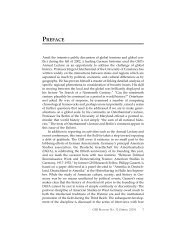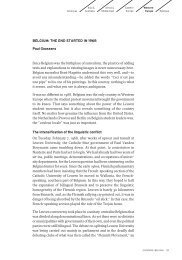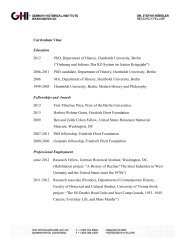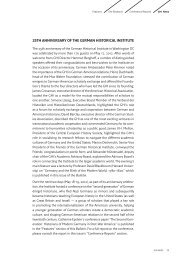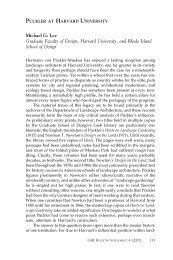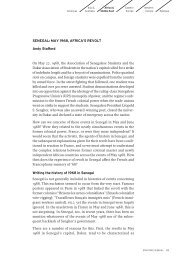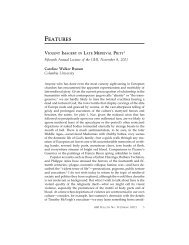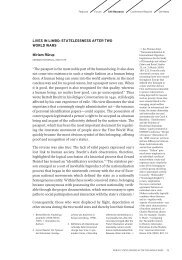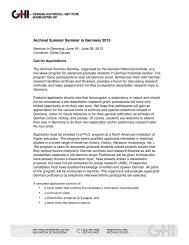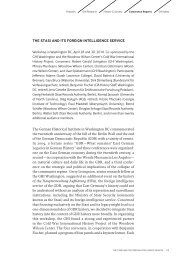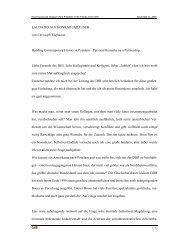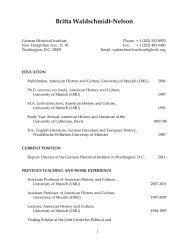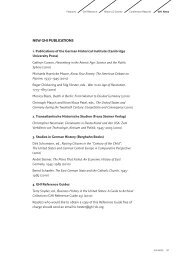German Student Exchange Programs in the United States, 1946-1952
German Student Exchange Programs in the United States, 1946-1952
German Student Exchange Programs in the United States, 1946-1952
You also want an ePaper? Increase the reach of your titles
YUMPU automatically turns print PDFs into web optimized ePapers that Google loves.
American teenagers, <strong>the</strong>ir <strong>in</strong>hibitions have become non-existent, <strong>the</strong>ir<br />
clo<strong>the</strong>s follow <strong>the</strong> pattern perfectly, and <strong>the</strong>ir English is excellent. Boys<br />
clad <strong>in</strong> Stetsons and cowboy boots were outstand<strong>in</strong>g among <strong>the</strong> students,<br />
although most of <strong>the</strong>m had taken to blue jeans. The girls, with short hair<br />
sh<strong>in</strong><strong>in</strong>g <strong>in</strong> <strong>the</strong> latest styles wore shorts and not a few were barefoot as a<br />
concession to <strong>the</strong> heat. It was a bit startl<strong>in</strong>g to hear <strong>the</strong>m chatter<strong>in</strong>g <strong>in</strong> <strong>the</strong><br />
typical slang of our own teenagers, with just enough accent to make <strong>the</strong><br />
words sound different.” 58 The change of appearances of <strong>the</strong> girls were<br />
probably <strong>the</strong> most obvious. Many had arrived with braids which <strong>the</strong>y<br />
would carry home <strong>in</strong> <strong>the</strong>ir suitcases, sometimes along with sh<strong>in</strong>y new<br />
even<strong>in</strong>g gowns that resembled ensembles known from <strong>the</strong> movies. 59<br />
Such startl<strong>in</strong>g changes could cause problems of readaptation upon<br />
<strong>the</strong>ir return to <strong>German</strong>y, as a few articles po<strong>in</strong>ted out. AFS addressed <strong>the</strong><br />
problem <strong>in</strong> its f<strong>in</strong>al orientation round to <strong>the</strong> students: “They discussed <strong>the</strong><br />
necessity for un-Americaniz<strong>in</strong>g <strong>the</strong>mselves before <strong>the</strong>y reached home, so<br />
as not to shock <strong>the</strong>ir families. Mr. Edgell asked <strong>the</strong>m to th<strong>in</strong>k before<br />
start<strong>in</strong>g to show off as world travelers, <strong>in</strong> order not to antagonize <strong>the</strong>ir<br />
fellow countrymen, and thus undo <strong>the</strong> good that is expected from <strong>the</strong>se<br />
student exchanges. The differences <strong>in</strong> standards of liv<strong>in</strong>g was brought<br />
out, and <strong>the</strong>y were cautioned to return as natives of <strong>the</strong>ir own countries<br />
still, bent on us<strong>in</strong>g <strong>the</strong> good th<strong>in</strong>gs <strong>the</strong>y have learned to improve <strong>the</strong>m,<br />
and on avoid<strong>in</strong>g such American faults as have caused misunderstand<strong>in</strong>gs.”<br />
60 Organizers were concerned that <strong>the</strong> success of <strong>the</strong> exchange of<br />
persons programs with regard to <strong>the</strong> exchange participants’ mission<br />
upon <strong>the</strong>ir return, would be endangered by <strong>the</strong> change of appearance,<br />
attitude and behavior. Chosen as potential future leaders <strong>in</strong> <strong>the</strong>ir home<br />
country it was essential that <strong>the</strong> returnees would not alienate <strong>the</strong>mselves<br />
from <strong>the</strong> o<strong>the</strong>r <strong>German</strong>s, so that <strong>the</strong>y would be able to ma<strong>in</strong>ta<strong>in</strong> and build<br />
up <strong>the</strong>ir <strong>in</strong>fluence.<br />
Failures were rarely reported. It seemed that <strong>in</strong> most cases <strong>the</strong> careful<br />
selection process prevented <strong>the</strong>m, although a few placements did not<br />
work out, and sometimes <strong>the</strong> exchange experience caused new prejudices:<br />
In ten cases families were changed for reasons of maladjustment.<br />
One <strong>German</strong> girl, who was too ‘sophisticated’ was returned<br />
home. Perhaps <strong>the</strong> ma<strong>in</strong> failure came with a 17-year-old boy who<br />
lived <strong>in</strong> Birm<strong>in</strong>gham, Ala., study<strong>in</strong>g at Phillipps High School. He<br />
had arrived from <strong>German</strong>y without a prejudice <strong>in</strong> <strong>the</strong> world. His<br />
fa<strong>the</strong>r had died oppos<strong>in</strong>g <strong>the</strong> anti-Semitic program of Hitler. He<br />
had never seen a Negro. When he gave his views of life <strong>in</strong> <strong>the</strong><br />
South, he spoke amus<strong>in</strong>gly with a rich Sou<strong>the</strong>rn accent—but<br />
what gave <strong>the</strong> accent po<strong>in</strong>t was that he had taken on completely<br />
GHI BULLETIN NO. 30(SPRING 2002) 133




